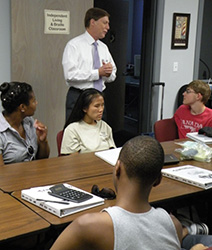Transition Services

Transition activities are coordinated among a team. The team consists of the student, you as parent(s) or caregiver(s), educators, service providers, and friends.
The activities must be designed to produce an outcome. This outcome should provide for maximum independence. The young person and his or her team select goals for adulthood, and the activities and services in the plan are designed to reach those goals.
The transition must promote movement from school to post-school activities. The final goal is to ensure that your child can be an independent adult.
The desired outcome can include any number of goals such as post-secondary education, vocational training, employment, supported employment, continuing and adult education, adult services, independent living, and community participation.
The outcome must be based on the individual student’s needs, preferences, and interests.
The activities in the process can include instruction, related services, community experiences, the development of employment and other post-school, adult-living objectives, functional vocational evaluation, and, when needed, the acquisition of daily living skills.
A well-managed transition gives young adults the chance to have the greatest possible independence, competence, enjoyment, and mastery of life.
Ensuring success is possible through teamwork. The team consists of the student, family and friends, educators, and professionals from government and private agencies. You may invite team members yourself. However, ensure that you inform the team leader so their name can be added to the team list shown on the IEP forms.
School to Work
School-to-Work Transition Program consist of a group of services that are provided by the Division of Blind Services and local partners on an individualized basis for students eligible to receive services under an individual education plan. Services are determined based on each individual client’s needs. Types of services that may be provided are:
- Assessment - Includes a comprehensive evaluation in orientation and mobility, adaptive daily living skills, assistive technology, low vision needs, functional assessments, vocational evaluation and job readiness
- Information and Referral - Provides specific information to an individual or group which aids them in securing assistance and collateral services which they are entitled to and from which they may benefit.
- Assistive Technology - Trains an individual or group to use adaptive devices and technology for communications, daily living needs including computer, keyboarding, access software, screen readers, note takers, closed circuit televisions, accessible cell phones and other devices.
- Counseling Services - Provides counseling to address psychological and social issues related to vision loss.
- Job Readiness - Includes resume preparation, interview training, appropriate hygiene and grooming training, accessing transportation and time management training. Services also include simulated job tasks to enable the individual to adjust to work or provide a work experience.
- Job Coaching - Provides on-site instruction to enable a participant to perform the assigned job related activities.
- Additional Training - Training not listed elsewhere such as, home and personal management.
Prepare for Success
Research shows that young people who are blind or severely visually impaired, no matter how intelligent, need the following skills to function effectively and competitively in the real world.
- Orientation and mobility (teaching the child to understand spatial position and how to travel independently);
- Daily living skills (training in how to live independently, including maintaining clothing, preparing meals, cleaning, and managing money);
- Assistive technology skills (use of an audible screen reader, large print magnification, or a Braille display, keyboard skills, access games, word processing, and other programs); and,
- Braille instruction (teaching the child to read using the Braille system).
It is important to ensure that your child learns these skills. The school's vision program and Florida Blind Services can assist your child in reaching these goals.
Selecting a Career
The purpose of vocational rehabilitation is to achieve career goals. The Rehabilitation Act requires that people with disabilities have an active voice in choosing employment goals in keeping with their interests and abilities.
Someone who wants to (and is able to) be a lawyer, scientist or minister should not settle for a job as a receptionist in the firm where those professions are practiced unless it is only a step in a plan that goes further. Career goals should be consistent with the student’s interests and abilities.
The first step is to select a job or career goal. Vocational Rehabilitation Counselors can assist with this process if a student isn’t sure of what he or she would like to do. Students in high school may even request work experiences to gain basic work skills that are needed on any job. When a career goal is selected, training will be provided to achieve the desired goal.
Assistive Technology
Today there is both high and low technology available to assist students in achieving academic success and their career goals. Schools are required to ensure that students have access to assistive technology. Being proficient in using assistive technology is key to ensuring that a person who is blind or severely visually impaired can maintain employment.
Become more aware of the type of assistive technology available to persons who are blind or severely visually impaired.




